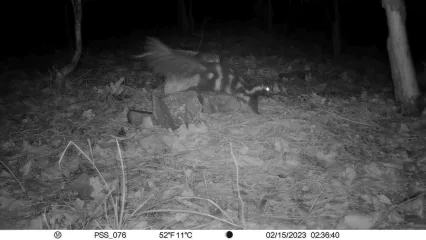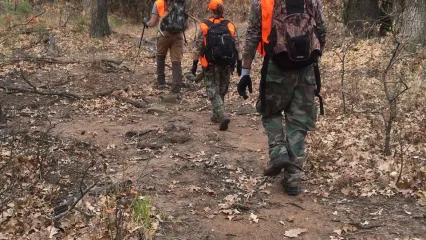Attention Non-Residents
The Oklahoma Wildlife Conservation Commission adopted new rules in 2025 that require non-residents accessing certain Oklahoma public hunting and fishing areas to check in and out of the area. By checking in and out of these areas, hunters, anglers, shooters, birdwatchers, hikers and any other users can help the Wildlife Department better understand how the area is being used. There is no additional cost associated with checking in or out of an area. There is no limit to the number of check ins for an individual in a year.

Candy Creek WMA is comprised of 605 acres in far eastern Osage County, just northeast of the town of Avant. In the 1970s, the US Army Corps of Engineers purchased lands along Candy Creek to be part of a flood control reservoir. After the land was condemned and purchased, problems arose that prevented reservoir construction. After many years of the land being idle, the federal government offered the original landowners or their heirs the opportunity to repurchase their land. Eighty percent of the land was repurchased by former landowners. The remaining two tracts were deeded to the Department via the National Park Service’s Lands to Parks Program.
Candy Creek WMA has a great deal of vegetative diversity. The north tract, on the north side of the county road known as “Ramona Road”, just east of the Candy Creek bridge, is 74 acres of a mix of tallgrass prairie, upland timber-mainly post oak, bottomland timber-pecan dominant, and two old crop fields. Initial plans call for the crop field adjacent to the county road to be developed for dove hunting opportunities. The south tract has sandstone based soils on the west end, with post oak timber being dominant. In the low elevations that were going to be the bottom of the lake, rich bottomland soils occur. Much of this acreage was formerly introduced pasture, this acreage will be converted to habitat in the future. As you transition up in elevation, there are more areas of post oak timber with a limestone substrate. Highest elevations have very shallow limestone soils and are dominated by tallgrass prairie.
From Avant: ¾ mile east on State Hwy 11, left (northeast) on access road, ¾ mile to entrance.
- Waterfowl: Low numbers present
- Deer: White-tailed deer are present in good numbers but are highly sought after.
- Rabbit: Cottontails are present and fair populations can be found at scattered locations in the upland habitats.
- Dove: Dove are usually present in fair numbers around manipulated fields.
- Quail: Bobwhites are present in low numbers at scattered locations in the upland habitats.
- Squirrel: Both gray and fox squirrels are present in good numbers.
- Turkey: Rio Grande wild turkeys are present at a very low density.
- Furbearers: Coyote, bobcat, raccoon, and beaver are available.
Management efforts on the north tract focus on producing native wildlife foods and cover through habitat protection. A single food plot is planted that is also often manipulated for a dove field. The south tract also focuses on producing native wildlife food but also uses prescribed grazing to improve quail habitat. Two food plots are also planted on the south tract once the cattle have been removed in late summer.
Camping is allowed only at the access point to the south tract.
Candy Creek has a surprising amount of fish, including largemouth bass, spotted bass, sunfish and catfish. Two farm ponds on the south parcel also provide fishing opportunities.
Closed Seasons
Same As Statewide Seasons
Seasons w/ Special Restrictions
- Crow, Quail, Snipe, Woodcock, Duck, Merganser and Coot, Rabbit
Closed during the first nine days of deer gun season.
- Pursuit with Hounds for Furbearers, Predator/Furbearer Calling
Closed Mar. 16 - Aug. 31 and the first nine days of deer gun season.
- Squirrel
Sept. 1 - Feb 28, except closed during the first nine days of deer gun season.
- Turkey Fall Gun
Tom only, shotgun only.
- Trapping
Open to water sets, live box traps and enclosed trigger traps only.
- Turkey Spring, Youth Turkey Spring
One-tom limit; seasons combined.
Hunter and angler camping is allowed in designated areas.
Q: Do I need a special permit to hunt on Candy Creek WMA?
A: No, all you need to possess in order to hunt on Candy Creek WMA is a valid hunting license and the proper unfilled tags if required (unless otherwise exempt). People who use Candy Creek WMA for nonhunting or nonfishing activities, such as birdwatching or photography, are required to have either a Wildlife Conservation Passport or any current hunting or fishing license issued by the Wildlife Department.
Q: Can I hunt deer with a Muzzleloader/Gun at Candy Creek WMA?
A: No, deer muzzleloader and deer gun hunting is only allowed through the controlled hunts program. Areas with controlled hunts are subject to change annually. Visit gooutdoorsok.com to view and apply for elk, antelope, deer, youth deer, deer hunts for Motor Vehicle or Non-Ambulatory Permittees, spring turkey and youth spring turkey controlled hunts. The application period for controlled hunts generally opens in early April. Visit the controlled hunts page for exact dates.
Q: Can I hunt at Candy Creek between the end of spring turkey season and dove season (summer months)?
A: No, Candy Creek WMA is not open for hunting between the end of spring turkey season and the beginning of dove season due to an agreement between the National Parks Service (previous owner) and ODWC (current owner) when the WMA was transferred over to ODWC ownership.
For One Survey Team, “Getting Skunked” Smells Like Success
Getting skunks on camera was a critical first step in an Oklahoma State University survey team’s effort to learn more about the Plains spotted skunk population in southeastern Oklahoma. The secretive and little-known skunk was detected at about half of the survey sites on the Ouachita National Forest.
Apprentice Designation: A Learner's Permit for Hunting
Hunter education has greatly reduced hunting accidents, but if you can’t complete a course right away, the apprentice designation allows you to hunt under supervision. It works like a learner’s permit, giving you the chance to gain real experience safely until you finish hunter education.


